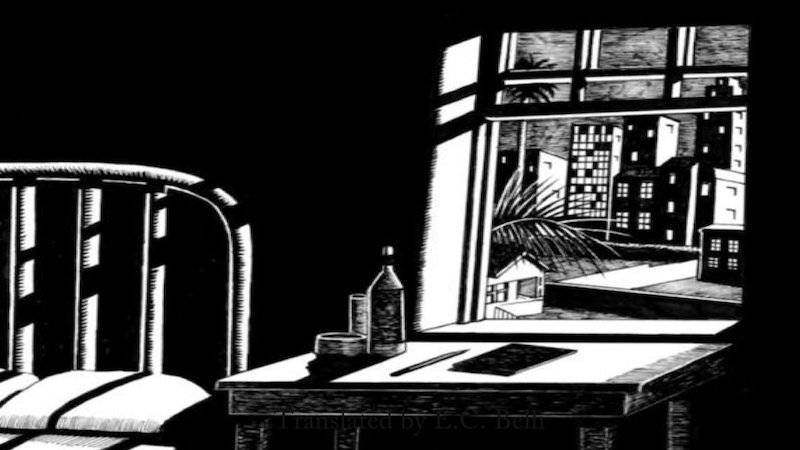Derek Walcott: Poet of Twilight, Poet of the Caribbean
Gabrielle Bellot on the Late Nobel Laureate
“The English language is nobody’s special property,” Derek Walcott said in an interview with The Paris Review in 1985. “It is the property of the imagination: it is the property of the language itself. I have never felt inhibited in trying to write as well as the greatest English poets.” In an earlier famous essay on the theater and the Caribbean, “What the Twilight Says,” Walcott had expanded upon this idea of inhibition, an idea those of us who grew up amidst the chiaroscuro contradictions of colonialism know well, even when we do not have the language for it.
“Colonials,” he wrote after contrasting the immense artificial lights of big cities to the dimness and rust and rot of our own towns, “we began with this malarial enervation: that nothing could ever be built among these rotting shacks, barefooted backyards and moulting shingles; that being poor, we already had the theater of our lives. In that simple schizophrenic boyhood one could lead two lives: the interior life of poetry, and the outward life of action and dialect.” The twilight says much about our islands: it is beautiful yet forgettable, a transition between day and night, a space not quite one thing or the other, like the sea’s phosphorescence. The twilight is a sublime contradiction, which means it is closest to describing reality—for Caribbean and cosmos alike, to be sure, but certainly for Caribbean.
I knew the twilight’s language well. It was much the same in Dominica, where I grew up. We had technology, yet the idea that we would be known for it across the world seemed ludicrous; we had gained our independence from the British, yet we retained their political systems and language and even, albeit more for certain older family members, a romanticized notion of the “Mother Country” (replaced, for my generation, more with America); we created art, indeed the Caribbean as a whole had some of the world’s best poets and novelists, yet few who were not artists believed we could actually create art; we were beautiful, yet almost no one in the world even seemed to know we were not the Dominican Republic, could not, indeed, differentiate Jamaica from the rest of the archipelago; if someone said he would do what Icarus did, we would gather around in a big crowd and joke and amidst the people saying he was crazy some would tell him to fly, even as many of us would not know who Icarus was or would not believe he could even get his wings off the ground, much less reach a star. We would dream, then fail, then dream, then, then, in the silly-sad way our government makes big claims, yet can rarely fix the road’s potholes for more than a month.
My mother had a book of Walcott’s on a shelf, which she had told me Walcott gave her many years ago when she used to work in St. Lucia. It was his Collected Poems. In some ways, it saved me, or, better, saved me from needing saving. As a child in the 1990s, all the books I read seemed to take place in America, Europe, or in worlds that did not exist; I remember sitting on my bed one day, a tattered novel from my father’s collection before me, and thinking I would need to learn the names of streets in New York or London to write a story. A book, I had been taught without anyone teaching it to me, could take place anywhere but my own island, even somewhere unreal. It was farcically naïve, yet it is hardly an uncommon story for those of us, around the world, who have grown up in countries once belonging to a European empire; we often begin growing up reading more about the art of the countries that colonized us than about our own artistic achievements, and we might even begin to think that our own nations are somehow less worthy of being written about. And if we are less worthy of a page, we seem less worthy of life.
Walcott, the first Caribbean writer I seriously read, was a revelation, as Earl Lovelace, Jean Rhys, C.L.R. James, Kamau Brathwaite, Jamaica Kincaid, Kwame Dawes, early V.S. Naipaul, and Gabriel Garcia Marquez would be later. I devoured Walcott’s Collected Poems as a tween, long before I understood the sinuous curves of his words, long before I understood the sea as language, as book, as history. Here was someone, suddenly, who seemed the greatest unacknowledged legislator I had ever read, only two islands down from me, fusing references to the colonial classics with the language of the sea, the mountains, the villages, the winds, the phantoms. He captured the day-to-day and the epic alike. I took the book with me to Florida for graduate school, turning to it at random, the poems growing as I did. The best art has many doors and floors, attics and cellars and verandas, but you may not find them for years—not because they are not there, but because you are not.
Walcott’s language was protean. It could be lazy and lacertilian, rhythmic as the tide, dense as our mountains and fleeting as their ghosts. You can hear T.S. Eliot through Walcott; more intriguingly still, you can read Eliot anew after Walcott. Frequently, he connected the Caribbean to the mythos of ancient Greece—most clearly in his own epic, Omeros, but ever-present elsewhere. In “Homecoming: Anse La Raye,” the students in school are “solemn Afro-Greeks, eager for grades,” learning “of Helen and the shades / of borrowed ancestors.” The theme becomes even more explicit in another poem, “Sea Grapes.” “That sail which leans on light,” Walcott writes,
tired of islands,
a schooner beating up the Caribbean
for home, could be Odysseus,
home-bound on the Aegean;
that father and husband’s
longing, under gnarled sour grapes, is
like the adulterer hearing Nausicaä’s name
in every gull’s outcry.
The references at once braided Walcott to the broad tradition of Western literature and reified the everyday reality of the Caribbean. We were living in our own epics, even if many of us, subconsciously, might have believed we could not ever be in something epic.
“Caribbean reality resembles the wildest imagination,” Garcia Marquez, who always considered himself Caribbean (and, of course, was), said to The Paris Review in 1981. I am an atheist, yet growing up in Dominica the marvelous always seemed the same as the real; it was simply a part of life, even in the digital age, for someone to go in secret to an obeah woman for magical cures or to believe that soucouyants might fly through the night. But the marvelous need not be magical. You can evoke it by what Viktor Shklovsky called defamiliarization: making mundane reality seem magical.
Walcott’s language is often rich, yet some of this richness comes from his source material itself: the ever-present, if subtle, potential for the marvelous that blooms almost everywhere in our islands: I would feel it as the evening shut her orange drapes and the night let loose her thick black Rapunzel’s hair across a world, fireflies twinkling in her curls, the dim orange streetlamp down the dirt road orbited by a chaos of shadowy bats and moths, would feel it seeing the horizon dotted with the flash of old lighthouses and the glow of divers’ flashlights, would see it in the crumbling forts and weathered cannons that had shot at French ships two centuries ago, would hear it in the reggae and dancehall carried on the winds up entire mountainsides so we could hear what was happening a mile away in the capital, the dark echoing with the witch cackles of the giant geckoes we called mabouyas, would see it again in Carnival and in the rust of zinc roofs and in the suicidally relaxed dogs that slept in the middle of winding roads where buses rushed along, tires brushing precipice edges, these roads that were too small and absurd for two cars to pass yet somehow they always did. It was everywhere, this vibrancy, this mundane crazy magicality.
But more importantly, the poem above evokes the sea and history together. Walcott would often do this. “The sea is history,” he titled one poem; Kamau Brathwaite similarly wrote that “the unity is submarine.” The sea and ocean are the roads the colonists took, as well as the Arawaks and Caribs who were there long before Columbus. In the mountain where I had lived in Dominica, the wind on a blue night always sounded like the sea, as everything ultimately somehow does. We can never escape the water.
I almost didn’t believe he was dead when I saw the news. It just quietly hit me, like age. I knew he had been very ill, yet somehow I had pushed aside the idea that he would ever not be there, as I had done with the other writer who perhaps meant the most to me formatively, Garcia Marquez. Near the end of his life, Walcott, with great humility, said true literary history in the Caribbean was only just beginning, yet those of us who write will never be able to ignore his poems, paintings, plays, prose. But, of course, Walcott and Marquez are both still there. Writers like this can never leave; they have changed the world. They can take Lady Death’s hand as she leads them to the starless place, but their footprints in this life will always be there.
Of course, I’m being silly, romanticizing. Marquez worried he would be forgotten, given his great popularity; in the Caribbean, the most incredible things can be forgotten, rotted and rusted away, so quickly, until they take on the translucence of an old dream. Writers endure for many reasons, some good, some bad, some for greatness, some by little more than the bigoted erasure of another. Perhaps the unnerving truth is knowing we can never know whose words will last, even when forgetting seems absurd, impossible, hateful in the moment.
*
In 2008, thinking V.S. Naipaul had grown too embarrassing in his cultural self-loathing, Walcott decided to make fun of him in a poem. “I think you’ll recognise Mr. Naipaul,” Walcott told an audience at the Calabash festival in Jamaica with perhaps a kind of Mephistophelean glee. “I’m going to be nasty.” He then launched into the poem, which was entitled “The Mongoose.” “I have been bitten, I must avoid infection / Or else I’ll be as dead as Naipaul’s fiction,” Walcott read to gasps and tittering laughter, the rhymes and brutality of the diss almost suggesting an image of Walcott as a rapper. “Read his novels, you’ll see just / what I mean,” he continued. “A lethargy, approaching the obscene… The plots are forced, the prose / sedate and silly.” Walcott then likens Naipaul—and Trinidad more broadly—to the image from his title, the mongoose, an animal imported into parts of the Caribbean from British India and thus a symbol of interpenetrating colonialisms. The “mongoose takes its orders from the Raj,” Walcott read, a nod to Naipaul’s love affair with Trinidad’s imperialists, as well as, perhaps, to Naipaul’s infamously calling Trinidadians monkeys. At the end, Walcott hits below belt and bra alike. “He doesn’t like black men,” Walcott said savagely, “but he loves black cunt.”
The feud between the two giants was telling, if unsurprising. Naipaul, perhaps taking a cue from the racism of Hegel or Hugh Trevor-Roper, notoriously wrote in 1962 that the Caribbean has no real history because it has not achieved anything of importance. “History,” he argued, “is built around achievement and creation, and nothing was created in the West Indies.” Twenty-four years earlier, C.L.R. James had argued much the opposite in his landmark study of the Haitian Revolution, The Black Jacobins, but Naipaul was infected with the cultural self-loathing that is all too often what grows first from the detritus of colonialism. Walcott never denied the difficulty and frustration of trying to create art in his home. But where he departed from the Trinidadian novelist was in how, throughout his life, he saw the art in our islands themselves and brought it out; Naipaul did this only in his earlier work, like Miguel Street and the magisterial A House for Mr. Biswas, and the power, the Caribbeanness, whatever that abstraction might be, of these works is why Naipaul’s rejection stung all the more. (His later absurdities, perhaps most of all the head-shaking sexism of his claim to know whether or not a woman had written a book from its first paragraph and his rejection of any woman writer as his equal, only made Naipaul look more like a cartoonish villain.) Of course, rejecting the islands for a kind of imperial approval is also Caribbean. We are many things all at once, contradictions and complements, like the hybrid forms of Wifredo Lam’s The Jungle, like twilights. Naipaul is certainly a mongoose; he is a product of a world, all the same. It is not Naipaul himself, but what he represents, that leaves a sad rot in the air.
“The classics can console,” Walcott wrote in another poem many decades prior. “But not enough.” He could have been talking about Naipaul, just as he could have been—and was—talking about all the world’s nights.
*
Walcott has passed. Our literatures are blooming, wonderful, protean, sci-fi and fantasy and queer novels and all in-between, genres at times quite distinct from the themes Walcott’s work evoked, though, as Junot Diaz asks, who more sci-fi than us? I’m excited by what is to come. But I can never forget Walcott. After all, he helped give me language, as he did for many others. And that is a special kind of love, the writer who helps others speak—and, with that, love more.
“Break a vase,” he said in his Nobel Lecture, “and the love that reassembles the fragments is stronger than that love which took its symmetry for granted when it was whole.” So it is. So it is.




















